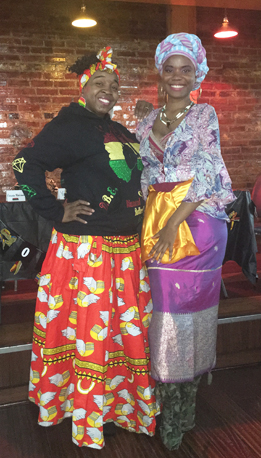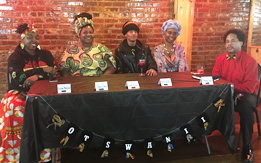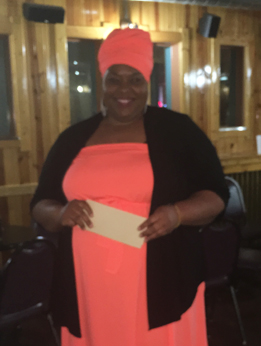|
Fashions,
Fros & Finds
Otswanii: Deeper Than Wrap
By Megan Davis
The Truth Contributor
Headwrapping is a tradition in African and other cultures
that has varied significance for the bearer of the wrap. A
Zulu woman may wear a head covering as a sign of respect to
her in-laws while the women of the Zion Christian Church
wear head coverings inside and outside of the church.
Headwraps
may also be regarded as a sign of humility, bereavement and
modesty. Likewise, they may be worn in celebrations such as
weddings. They too, can cover a “bad hair day” or protect
the hair when working out or for many women who work in
trades, it is a more fashionable way to cover the head in
lieu of masculine du rags, stocking caps and bonnets.
What is
less talked about is the stain of negativity surrounded
covering the head during slavery. Not only was it difficult
for women to maintain the health of their hair due to
working long hours in extreme temperatures, it was also a
sign of oppression in that women’s hair had to be of a
certain texture and style in order to be acceptable for
employment; something that has been at the center of
litigation between employers and schools who often ban
African hairstyles from their institutions. Whether it
represents marital status, age, or a level of respect, the
wrap is deeper than the fabric, color and its placement on
the head.
Otswanii,
Deeper Than Wrap was an event founded by model, artist and
mentor Meecheb whose vision was to educate people about the
cultural significance and artistic expression of
headwrapping.
The event,
which was held at The Peacock in downtown Toledo, began with
a headwrapping class at which time guests could ask
questions and get tips on wrapping while learning about the
different types of wraps and what they represent. Local
vendors were on hand, offering handmade goods such as With
Sprinkle’s cosmetic glitter and body butters as well as body
oils and incense.
“We don’t
have legacies or businesses for our children to inherit.”
Megan Davis stated during the panel discussion.
“Everything I learned, I had to learn on my own.” said
Rochelle Morrishaw, dance artist and owner of Fete to Fit.
“When my oldest decided this year, that they wanted to go
work for somebody else, I looked at them like ‘you must not
have common sense’ because the only option is for them to
work for themselves or myself.” Morrishaw continued. “ I am
teaching my children to build generational wealth.”
|

Fete to Fit owner and panelist, Rochelle Morrishaw, with
founder Meecheb

Panelists Rochelle Morrishaw, Megan Yasu Davis, Elijah
Isaacs, Meecheb and Antwan Oxner

Panel moderator and Otswanii model, Latisha Williams |
|
This event
gave two small black-owned businesses an opportunity to
engage new customers and receive support where they
otherwise may not have had the chance to experience.
The panel
discussion, moderated by Latisha Williams, included a deep
dialogue of pressing issues in the black community today.
From questioning whether or not gender roles have changed
with the feminist movement to addressing the problem of
financial illiteracy in the black community, the questions
posed sparked high-octane remarks between the panelists and
the audience.
“The male
structure is being torn down in our homes. We know society
has a target on our heads, but if we don’t take
responsibility for our roles in the family in the home and
community, mentoring them and teaching our sons how to dodge
the bullets both in the streets and in politrics, we are
failing them.” Antwan Oxner was replying to the question
‘Where is the black male structure in terms of male
emotions, the new black man, abuse, fatherless black men and
creative black men.’
Elijah
Isaacs, photographer and panelist concluded, “It’s going to
be a process; the instant gratification of it, it’s not
going to happen overnight. We have systematically been
brought down, so we must be patient in rebuilding the broken
families who have succumbed to statistics.” A process it is.
Several guests and panelists shared their experiences in
dealing with single parenting, co-parenting and finding ways
to break free from the system that has and continues to
oppress black families.
Otswanii,
a name that Meecheb birthed for this event and experience
brought art, culture, history and a healthy dialogue in an
enlightening manner much like the Oriyan definition of
Ojaswini which means lustrous. With its power letter, “O’,
Otswanii moved to inspire optimism for black people to
embrace their culture, rooted in African soil.
The event
closed with a fashion show of select models who were styled
by Meecheb, whose creativity expands multiple mediums.
Embracing one another, men and women departed The Peacock
feeling worthy, loved and connected an experience much
deeper than the wrap.
|